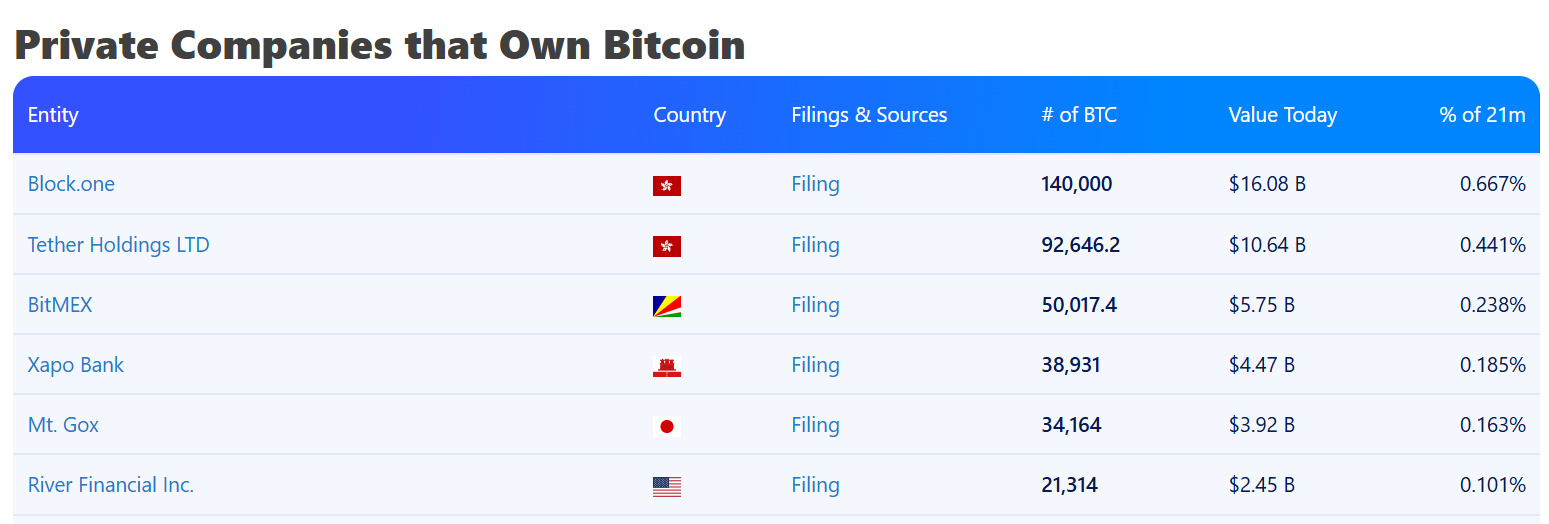Beyond MicroStrategy: Private Companies with the Biggest Crypto Treasuries
When you hear about corporate crypto treasuries, chances are your mind jumps straight to MicroStrategy. And fair enough—they’ve gone all‑in on Bitcoin with over 600,000 BTC on their books.
While public companies often grab the headlines, a growing number of private firms are quietly stacking serious amounts of crypto—particularly Bitcoin—as part of their treasury strategy. These are not fly‑by‑night startups or speculative bets. We're talking about established players making deliberate, long‑term moves.
Let’s take a closer look at who they are, how much they’re holding, and what it signals for crypto’s evolving role in corporate finance.
Why This Shift Matters
Crypto treasuries aren’t just a flex anymore—they’re becoming a strategic asset class. Private companies aren’t under the same disclosure spotlight as public ones, so their accumulation tends to fly under the radar. But together, these firms now hold hundreds of thousands of BTC, making them key players in the ecosystem.
And the motivations go beyond hype. From inflation hedging to balance‑sheet diversification, these companies are signaling their belief in Bitcoin as a long‑term store of value—not just a speculative play.
The Biggest Private BTC Holders (And Why They're All In)

Source: https://bitbo.io/treasuries/
1st place: Block.one
Holding: ~140,000 BTC (~0.67% of total supply)
Block.one, the private company behind the EOS blockchain, has built an impressive Bitcoin portfolio, reportedly holding around 140,000 BTC. Unlike public companies or ETFs that regularly disclose their holdings, Block.one’s private status means updates are less frequent—but the size of its treasury clearly establishes it as a major player in the Bitcoin ecosystem. This substantial position reflects a strategic commitment to Bitcoin’s role as a foundational asset for blockchain infrastructure and Web3 development.
2nd place: Tether Holdings
Holding: ~92,646 BTC (~0.44% of total supply)
Tether, issuer of the world’s most widely used stablecoin USDT, quietly became one of the biggest Bitcoin whales in the private sector. While most companies hold BTC for treasury diversification, Tether’s position is different: it uses BTC as part of its reserves backing USDT, alongside U.S. Treasuries and gold.
This isn’t just a hedge—it’s a signal that Bitcoin is now a backbone asset even for stablecoin giants. Tether’s BTC accumulation also coincides with its record-breaking profits in 2023–2024, allowing it to strengthen reserves without hurting liquidity.
3rd place: BitMEX
Holding: ~50,017 BTC (~0.24% of total supply)
BitMEX, a pioneering crypto derivatives exchange co-founded by Arthur Hayes, has maintained a substantial Bitcoin treasury despite facing legal challenges and management changes. The company’s BTC holdings—likely a mix of corporate reserves and insurance funds—reflect the founders’ deep conviction in Bitcoin’s value and their ongoing commitment to supporting the ecosystem even as the exchange evolves under new leadership.
4th place: Xapo Bank
Holding: ~38,931 BTC (~0.18% of total supply)
Originally a Bitcoin wallet and cold storage provider, Xapo evolved into a fully licensed private bank based in Gibraltar. Xapo was early—very early—in Bitcoin. The company helped high-net-worth individuals store BTC securely before institutional custody became mainstream. Its treasury is not only a strategic asset but a proof-of-concept: Bitcoin can coexist with compliant, regulated financial structures.
5th place: River Financial
Technically, the fifth-largest private holder of Bitcoin is Mt. Gox, with about 34,164 BTC. But since the exchange has been inactive since its 2014 collapse—and those funds are locked in legal proceedings awaiting distribution to creditors—Mt. Gox is usually left out of current rankings.
Stepping into the active fifth spot is River Financial, a U.S.-based Bitcoin-focused company with holdings around 21,314 BTC. Unlike multiproduct crypto firms, River is laser-focused on Bitcoin, offering brokerage, mining, and custody services designed for long-term BTC accumulation. Its treasury isn’t just a reserve—it’s part of a broader mission to build a modern Bitcoin-native financial ecosystem.
And What About Ethereum?
While private Ethereum holdings remain largely undisclosed, public companies have been more vocal about their ETH treasuries. Leading the pack is BitMine Immersion, which holds over 833,000 ETH valued at nearly $3 billion, making it the largest publicly traded ETH treasury in the world. Another notable public holder is SharpLink Gaming with around 521,939 ETH.
BitMine and SharpLink show bold treasury moves, while Coinbase’s ETH holdings are more operational, tied to its role as an exchange and staking provider. With 137,300 ETH, Coinbase runs the largest ETH staking service in the U.S., managing over 11% of all staked ETH. Their holdings serve operational needs, corporate treasury, and institutional reserves.
Key Takeaways for Builders, Analysts, and Treasury Watchers
- Crypto treasuries are going mainstream—private companies are integrating Bitcoin strategically into their balance sheets.
- A lot happens quietly—private firms aren’t required to disclose holdings, but the data shows substantial accumulation nonetheless.
- Ethereum is catching up—public companies are already staking ETH treasuries; private firms may soon follow suit.
Private crypto treasuries are not just numbers—they’re signals. They show who’s betting long on crypto, who’s building for the future, and who’s quietly shaping the next financial layer. Whether it’s Bitcoin as a reserve or ETH as operational capital, these holdings reflect a deeper integration between businesses and blockchain.
One More Thing: Tracking in Real-Time with GraphLinq
As crypto becomes a staple for corporate treasuries, knowing who holds what—and when it moves—is critical.
GraphLinq helps you stay on top of this by offering multi-wallet tracking, high-volume filters, and real-time alerts straight to your Telegram—all without writing any code.
Whether you’re following quiet accumulation or tracking major public treasury shifts, having the right tools to keep up makes all the difference.




.jpg)
























%20Do%20Bitcoin%20Cycles%20Still%20Work_.jpg)
%20What%E2%80%99s%20Next%20for%20Bitcoin%20in%202025_.jpg)



%20What%20Is%20a%20Crypto%20Swap.jpg)






























.jpg)
%20How%20to%20Find%20New%20Cryptocurrencies%20%20Worth%20Investing%20In.jpg)
%20Understanding%20Cryptocurrency.jpg)

.jpg)

A%20Comprehensive%20Guide%20to%20Altcoin%20Season.jpg)
%20cases%20and%20Future%20of%20Ai%20in%20Crypto.jpg)
%20How%20to%20Create%20Your%20Own%20MetaMask%20Wallet.jpg)
%20How%20to%20use%20your%20Crypto%20wallet%20safely.jpg)
What%20is%20a%20smart%20contract.jpg)
%20How%20to%20Protect%20Against%20Crypto%20Scams%20and%20Ponzi%20Schemes.jpg)









